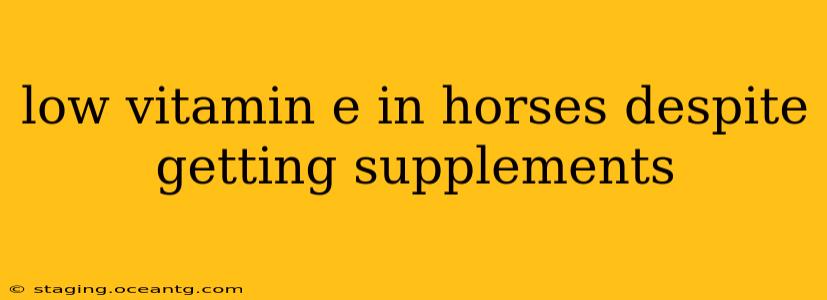Many horse owners diligently supplement their equine companions with Vitamin E, believing it crucial for maintaining muscle health and overall well-being. However, some horses still exhibit signs of Vitamin E deficiency despite consistent supplementation. This perplexing situation warrants investigation into several contributing factors. This article explores the reasons why your horse might still be low in Vitamin E even with supplementation and offers solutions to address this concern.
Why is My Horse Low in Vitamin E Despite Supplements?
This is a common question among horse owners, and the answer often isn't straightforward. Several factors can interfere with Vitamin E absorption and utilization, even when supplements are provided.
1. Supplement Quality and Formulation:
The quality of the Vitamin E supplement plays a significant role. Not all supplements are created equal. Some may have lower bioavailability, meaning the horse's body doesn't absorb the Vitamin E effectively. The form of Vitamin E (e.g., d-alpha-tocopherol, the most biologically active form) also matters. Look for supplements that clearly state the form and dosage of Vitamin E used. Furthermore, the presence of other ingredients in the supplement could interfere with absorption.
2. Underlying Health Issues:
Several health conditions can impair Vitamin E absorption or increase the body's need for it. These include:
- Liver Disease: A compromised liver can struggle to process and utilize Vitamin E effectively.
- Malabsorption Syndromes: Conditions affecting the digestive system can hinder the absorption of nutrients, including Vitamin E.
- Oxidative Stress: High levels of oxidative stress, often associated with intense exercise or illness, can deplete Vitamin E stores faster than they can be replenished.
- Selenium Deficiency: Selenium works synergistically with Vitamin E; a deficiency in selenium can impact Vitamin E's effectiveness.
3. Dosage and Frequency:
The recommended dosage of Vitamin E varies depending on the horse's size, activity level, and overall health. An insufficient dose, even with regular supplementation, may not provide enough Vitamin E to meet the horse's needs. Similarly, inconsistent administration of the supplement can lead to fluctuating levels of Vitamin E in the horse's body.
4. Interaction with Other Medications or Supplements:
Some medications or other supplements can interfere with Vitamin E absorption or metabolism. It's crucial to discuss any medications or supplements your horse is receiving with your veterinarian to ensure there are no negative interactions.
5. Testing Methods and Accuracy:
Blood tests for Vitamin E can have varying levels of accuracy, and results might not always reflect the true Vitamin E status in muscle tissue, where deficiency is most clinically relevant. There can be a disparity between blood levels and actual tissue levels of vitamin E.
How Can I Ensure My Horse Gets Enough Vitamin E?
To address low Vitamin E levels despite supplementation, take the following steps:
- Consult Your Veterinarian: A veterinarian can perform thorough testing to determine the underlying cause of the deficiency and recommend the appropriate dosage and formulation of Vitamin E supplements. They can also check for other health issues that may be contributing.
- High-Quality Supplements: Choose high-quality supplements containing d-alpha-tocopherol, the most bioavailable form of Vitamin E. Look for supplements with transparent labeling detailing ingredients and potency.
- Optimized Dosage: Follow your veterinarian's recommendation for dosage and frequency of supplementation based on your horse's individual needs.
- Dietary Considerations: While supplements are often necessary, ensure your horse's diet includes adequate sources of Vitamin E, such as fresh green forage.
- Regular Blood Testing: Periodic blood tests can help monitor Vitamin E levels and adjust the supplementation strategy as needed. Discuss the frequency of testing with your veterinarian.
By carefully considering these factors and working closely with your veterinarian, you can significantly improve your horse's Vitamin E status and ensure its overall health and well-being. Remember that a holistic approach, combining proper nutrition, quality supplements, and veterinary oversight, is key to resolving this issue.
